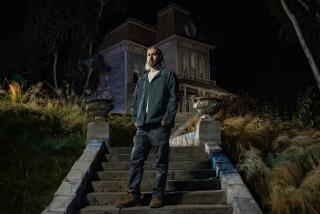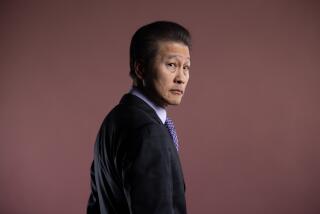‘East-West’ Is Gripping Tale of Dispossessed Souls
Regis Wargnier’s Oscar-nominated “East-West,” a superb follow-up to his 1993 Oscar-winning “Indochine,” takes the most somber of predicaments, and makes it involving, romantic and ultimately intensely suspenseful.
In doing so, it brings to light the dire fate of some 120,000 forgotten people and their descendants--Russians who after the 1917 revolution fled to France, Bulgaria and Yugoslavia. After World War II, they were warmly invited home by Josef Stalin to help rebuild the devastated country. The USSR needed them, but with the dawning of the Cold War, Stalin feared them even more, regarding them as “imperialist spies.” (The Soviets also wanted to reduce the size of the expatriate communities in case they at some point tried to claim that they represented the legitimate Russian government.)
Wargnier and his co-writers, which include “Prisoner of the Mountains” writer-director Sergei Bodrov--and inspired by real-life experiences--tell of a young, Russian-born French doctor, Alexei (Oleg Menchikov), who in June 1946 returns to the Soviet Union with his French wife, Marie (Sandrine Bonnaire), and their little son. Upon arrival, the three are separated. Officials tell Alexei to divorce Marie, who at that moment is being brutally beaten as a spy, her French passport torn to shreds, but Alexei stands by his wife.
*
In short order, Alexei, reunited with Marie and their son, is sent off to Kiev to become a factory medical officer, where he and his family are housed in an old mansion-turned-tenement. Marie and Alexei are trapped in a harsh, paranoid totalitarian state, and their predicament exacts its toll on the marriage. Alexei does well in his job, but Marie, in her bitterness and frustration, does not fully acknowledge how vulnerable her husband is and how concerned he is in protecting her and their son.
Their relationship has deteriorated badly when several years later Marie sees her first opportunity to regain her freedom with the arrival of a celebrated French actress, Gabrielle (Catherine Deneuve), and her acting troupe. Watching Gabrielle in a production of “Mary Tudor,” Marie can’t help but respond to the queen’s observation that “we poor women truly never know what a man’s heart holds.” But even if Marie is able to speak with Gabrielle of her plight, how and when will the French actress be able to help her?
It’s at this point that, after depicting the cruel realities of Alexei and Marie’s existence with the utmost persuasiveness, the film shifts gears and gathers momentum, gradually but consistently building suspense as Marie becomes increasingly determined to escape the Soviet Union. As with “Indochine,” Wargnier displays his mastery in blending epic scale with the highly personal, and “East-West,” filmed on location in Russia and elsewhere has sweep, grandeur, an aura of authenticity and an eye for the telling detail.
Artistry and craftsmanship abound in this period-perfect film, which was photographed stunningly in appropriately muted hues by Laurent Dailland. The film’s performances are equally glowing. Bonnaire has the angular beauty and strength of character to portray to perfection a woman whose proudly defiant spirit proves unquenchable. Menchikov expresses quietly the agony of a man put in a terrible position, a man who quietly continues to love his wife even after she believes he has forsaken her.
*
For all its fervent protest, sweeping romanticism and gathering suspense, “East-West” is anchored by a strong sense of everyday life--of people making the best of grim circumstances. Playing an activist-actress modeled after Simone Signoret and Maria Casares, Deneuve has the film’s pivotal role even though she does not appear until halfway through. When she does, you must believe in her Gabrielle instantly, both as a great star and a woman of courage and determination. With her authority and beauty, Deneuve is ideal casting, and it is her radiant presence and absolute conviction that makes the film work.
Sergei Bodrov Jr. has the film’s other key role as Sacha, a handsome young neighbor whose once-wealthy family owned the grand townhouse in which he, Marie and Alexei live in such crowded conditions. Another outstanding collaboration from Wargnier and Deneuve, who first teamed on “Indochine,” “East-West” may have lost the best foreign language film Oscar to “All About My Mother,” but it’s still a winner.
* MPAA rating: PG-13, for violence and brief sensuality. Times guidelines: serious adult themes and situations.
‘East-West’
Sandrine Bonnaire: Marie
Oleg Menchikov: Alexei
Catherine Deneuve: Gabrielle
Sergei Bodrov Jr.: Sacha
A Sony Pictures Classics release of a French-Russian-Spanish-Bulgarian co-production: UGCYM/NTV Profit/Mate Productions/Gala Films/France 3 Cinema with the participation of Canal Plus and Sofica Sofinergie 5. Director Regis Wargnier. Producer Yves Marmion. Screenplay Rustam Ibraguimbek, Sergei Bodrov, Louis Gardel and Wargnier. Cinematographer Laurent Dailland. Editor Herve Schneid. Music Patrick Doyle. Costumes Pierre-Yves Gayraud. Production designers Vladimir Svetozarov, Alexei Levtchenko. Set decorator Jean-Philippe Reverdot. In French and Russian, with English subtitles. Running time: 2 hours, 5 minutes.
Exclusively at the Royal, 11523 Santa Monica Blvd., West Los Angeles, (310) 477-5581; Town Center 4, Bristol at Anton, South Coast Plaza, Costa Mesa, (714) 751-4184 or (714) 777-FILM (No. 323); and the Colorado, 2588 E. Colorado Blvd., Pasadena, (626) 796-9704.
More to Read
Only good movies
Get the Indie Focus newsletter, Mark Olsen's weekly guide to the world of cinema.
You may occasionally receive promotional content from the Los Angeles Times.










